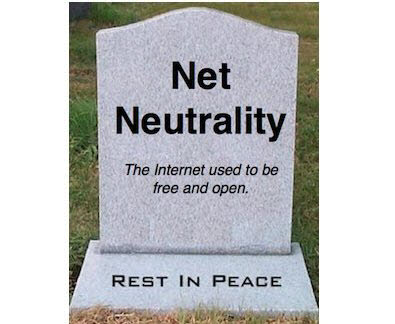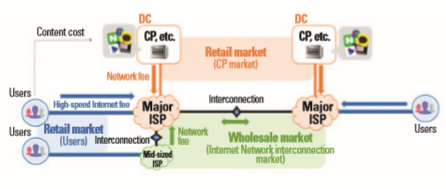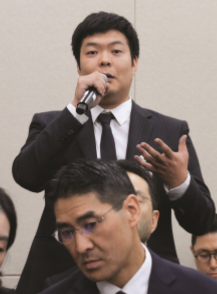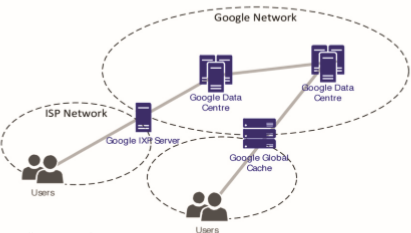When people order deliveries, they pay more than the original price, because they also pay delivery fees. It means that if a user wants a payload to be moved to a place, the user should be charged more for a shipping fee. Recently, as the 5G era begins, greater quantities of data can be transmitted in a much shorter time. Then, who pays these shipping fees and, more specifically, these data transportation fees? For example, when people watch movies on Netflix, who should be responsible for the shipping fees that are charged while a movie is sent from the contents provider (CP), Netflix, to a user? To answer this question, the Sungkyun Times (SKT) will discuss network fees, the delivery fees of Internet content, and how the controversies regarding these fees in Korea have developed. Later, the SKT will provide recommendations on the right way for network fees to help push forward the genuine 5G era.
Background Information for Understanding the Network Fee Problem
General Review About the Internet
The origin of the word Internet lies on the international network, connecting all the computers in the world and incarnating an interconnected network. It is important to note that the meaning of the word implies everybody’s interconnectedness. Moreover, one of the principles of the Internet, net neutrality, should be on the table for discussion. Network neutrality, or simply net neutrality, states that Internet service providers (ISPs) should not discriminate against any traffic on their network regarding all kinds of data. For now, net neutrality is well-preserved in the Korean network market. Concisely, whether Netflix uses KT’s network, or YouTube does, KT should not discriminate against CPs, and this principle is also applied to general users. Like streaming cultures, novel Internet culture these days results from the foundation that a ton of internet businesses can run their organizations freely, based on net neutrality. In 2017, however, the net neutrality principle in America was abolished by the Federal Communications Commission (FCC). Taking the measure, they argued that it would facilitate investment on the network by ISPs. As the Supreme Court justified the measure of the FCC in February of this year, the concept of net neutrality is still unclear worldwide. The Ministry of Science and ICT (MSIT) of Korea has taken a series of actions like composing the Second Net Neutrality Research Team with several ISPs and CPs to correspond to changes in the Internet world.

What Are Network Fees?
Network fees are the costs that are charged when we use the networks. The way the network fees are imposed in Korea can be understood with the Internet Network Interconnecting Policy. It has been enforced by the former Ministry of Information and Communication since 2004, and the policy claims that if the interconnection is not operated fairly, there would be no fairness on the Internet market at that time. The interconnection means connecting two or more different networks physically.

This interconnection is an indispensable notion because interconnection is the core term to realize “any to any connectivity”, whether users use a specific kind of ISPs or not. As time has passed, the amount of network traffic from CPs has been inflated exponentially, but traffic from general users remains at similar levels. This change in the Internet world brought about the revised Internet Network Interconnecting Policy in 2016. This revision involves the meter-rate system, which differs from the original, in that costs depend on the used amount of network traffic. Further more, each ISP has a class per their Internet providing scale, and there was a free interconnection between the ISPs within the same class. However, in the meter-rate system, the costs would be charged even though ISPs are in the same class. Consequently, the revision has resulted in augmented network fees, and it has led to an amplified price on CPs as ISPs charge increased amounts of network fees on CPs. The major Korean CPs like Naver and Kakao paid 70 and 30 billion won in network fees respectively in 2019, obeying the revised policy.
Controversies Among Network Fees in Korea
The Development of the Controversies in Korea
The tinderboxes of the ongoing controversy regarding network fees get their momentum from the administrative litigation of Facebook to the Korea Communication Commission in August 2019. Facebook won the lawsuit because the court justified the legitimacy of a series of actions by Facebook, evading the interconnection problem. The adjudication signifies that the quality of Internet service is always the responsibility of ISPs, regardless of the quantity of traffic that CPs make. This, in turn, has further amplified the problem, especially for foreign CPs. The problem seems to be uncontrollable now, as Netflix, another foreign CP, sued SK broadband (SKB), an ISP, for the responsibility of network fees on April 14th, 2020. After this lawsuit, there will be a huge change regarding who is responsible for network fees in Korea and abroad.
The Network Fee Problems That Korea Bears
➊ Expensive Network Fees in Korea
Network fees are determined from confidential contracts between ISPs and CPs, so the exact fees are officially unknown. Still, external sources help infer the amount. Network fee information from industries or other network enterprises is not a reliable foundation, but by comparing it with other explicit events, meaningful results can be deducted.
Domestic ISPs have claimed that the amount of network fees has reduced consistently, but this argument wholly opposes the claims of domestic and foreign enterprises. Cloudflare, the American content distribution network (CDN) business, released the report, The Global Network Fee Analysis. The report said the network fees in Seoul are pricey, 15 times more than Europe or America. It designates the revised policy in 2016 from the former Ministry of Science, ICT and Future Planning as the cause of this situation. Though Korea has equal or better network infrastructure than Western countries, it is quite contradictory that Korea imposes higher fees than these countries. The main purpose of network fees is to further invest in networks, so charging more fees in Korea than Western countries seems inconsistent. Domestic CPs have also argued that the fees are too expensive. In the parliamentary inspection of the administration of the MSIT in October 2019, Park Tae-hoon, a representative for WATCHA PLAY, a Korean movie streaming service, posed the problem of excessive network fees. He said he is using Amazon CDN to avoid the pricey fees and is hesitating to launch 5G content services. This limitation of the system hinders Korean enterprises from introducing 5G services like 4K video streaming even though Korea is one of the 5G era leaders.

➋ The Discriminative Network Fees Between Domestic And Foreign CPs
In January of this year, Park Tae-hoon also illustrated the paradoxical situation that Korea faces in the National Assembly debate. He said, “4K streaming-ready entrepreneurs in Korea are fixed. They are Netflix, YouTube, or CPs from ISPs like wavve.” He points out the reality that the revised Internet Network Interconnecting Policy imposes immoderate fees on domestic CPs, but not on global CPs. They provide a cache server only or just take a free ride. Cache servers improve connection quality by storing data that domestic people frequently use, but cache servers also act as shelters for global CPs from network fees. Google is the best example of this case. As many people in Korea use smartphones, the number of Google service users and network traffic toward foreign servers soared. This resulted in a fall in service quality. To solve this issue, Google agreed with three major domestic ISPs to install a Google Global Cache (GGC) server.

It was a double-edged sword. According to the terms of the contraction, Google provides only the GGC server and administrates remotely, but ISPs take on the burden of all other expenses, like network fees. These agreements created a puzzling situation; Google pays near-zero network fees, while domestic CPs pay expensive network fees. Other foreign major CPs like Facebook and Netflix also run their cache servers, which are also free from the costs. Then, why do domestic CPs not operate cache servers like the foreign ones? Han Seong-sook, a representative for Naver corporation, answered this question by stating that domestic ISPs have prohibited the installation of cache servers of domestic CPs. This can be interpreted as a discriminating action based on nationality.
The Ongoing Paradox in the Network Fee Issue
The network fee problem finally returns to the problem of net neutrality; because there is a swiftly developing Internet and Internet ecosystem between ISPs and CPs. Therefore, the interests of the two groups are always in acute confrontation. ISPs (providers) proclaim that they invest astronomical costs in network infrastructure, so CPs cannot get profits using their networks for free. In contrast, CPs (users) maintain that based on the net neutrality principle, they cannot soothe the cost burden on ISPs because the net neutrality principle holds the perspective that networks are public property. Thus, the network fee problem in Korea now can be explained in a somewhat different way, as the confrontation of two ideologies: private or public interest pursuit. This is the discussion of which one should be given priority between the two; ISPs who make infrastructure or CPs who bring positive economic outcomes. It is a chicken-or-egg question, so settling the problem is not easy.
The Way Forward for a Genuine 5G Era
Reforming Network Fees Rationally
Setting aside the discriminating issues between the domestic and foreign businesses, network fees are still unreasonable, as discussed above. It means the revised Internet Network Interconnecting Policy does not help to solve the actual problem. This situation is still ongoing. According to the Guidelines for Fair Internet Network Contract by the Korea Communications Commission published in January of this year, the government has not tried to resolve this problematic situation. The 8th clause from the guideline uses ambiguous words, such as “proper reasons”, “unreasonable reasons”, and so on. Furthermore, Min-ho Kim, a professor from Sungkyunkwan University Law School, enunciated that constructing industrial structures where telecommunication companies can deny CPs that create lots of traffic is a violation of net neutrality. He also argued that if the telecommunication companies have the upper hand, content can be discriminated against, hindering the freedom of expression. In other words, discussions about net neutrality should be settled first before the reformation of network fees.
Re-concurrence Regarding Net Neutrality
Ernesto Falcon, the senior legislative counsel at the Electronic Frontier Foundation, said, “Only if Internet openness is guaranteed, there will be the advent of a second Google or Facebook. The alleviated net neutrality principle can make sophisticated Internet communication infrastructure useless.” He also emphasized his opinion exemplifying that BTS can be the top celebrity group in the world because of net neutrality. Thanks to net neutrality, firms like Google could start up their business without capital and become successful, and freedom on the Internet and further, the free principles in a democratic society, can be kept. The concept of net neutrality, however, was first coined 20 years ago, so it is outdated. The reason why the controversies about net neutrality have spread worldwide is that the speed of Internet development is fast, but the hegemonic notion for the whole Internet ecosystem is still unchanged. Therefore, before entering the genuine 5G era, the world should further discuss net neutrality and draw social concurrence as soon as possible.
Ongoing discussions about network fees in Korea means that the concept of net neutrality is still unclear. In this situation, society should deliberate about net neutrality in the present perspective and discover ways in which society wishes to or should go. The recent and reignited net neutrality problem between Netflix and SKB will determine the direction Korean society goes. Again, who should bear the burden of network fees, and why is that right? The prestige and spectrum of Korean Internet industries can be changed depending on Kingos’ answers.
